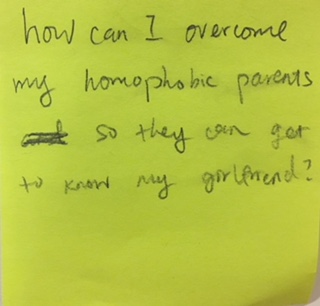Last Updated on June 6, 2023
Dealing with homophobic parents requires setting clear boundaries and prioritizing your own mental and emotional health. It’s important to remember that your parents’ beliefs do not define you as a person, and seeking support from friends, family, or a therapist can be extremely helpful.
Growing up with parents who are intolerant of lgbtq+ identities can be incredibly challenging. Children may feel rejected, invalidated, or even unsafe in their own homes. If you’re struggling with homophobic parents, it’s essential to create and maintain healthy boundaries that protect your wellbeing.
In this article, we’ll explore some tips for setting boundaries with intolerant parents while also prioritizing your own mental and emotional health. Remember, you are worthy of love, and there is a supportive community that accepts and welcomes you for who you are.

Credit: library.bc.edu
Understanding Homophobic Parenting
How To Deal With Homophobic Parents?
Homophobia can be defined as a fear, hatred, or intolerance of homosexuality, and homophobic parenting can have a lasting impact on children. If you’re struggling with homophobic parents, it can be challenging to navigate this situation while remaining true to yourself.
However, understanding the root cause of their behavior can provide you with the tools you need to handle this situation effectively.
Defining Homophobia And Its Impact
Homophobia is more than just disliking or disagreeing with someone’s sexual orientation. It is characterized by fear, intolerance, and hatred. Homophobic parents may make negative comments about homosexuals or use derogatory terms. This can have a significant impact on their children, leading to low self-esteem, depression, anxiety, and even suicide attempts.
Common Symptoms Of Homophobic Parenting
It’s essential to keep in mind that homophobia can manifest in different ways, and not all parents who dislike homosexuality are homophobic. Here are some common symptoms of homophobic parenting to look out for:
- Negative comments or jokes about homosexuals or homosexuality
- Persistent attempts to change or suppress a child’s sexual orientation
- Refusal to acknowledge or accept a child’s sexual orientation
- Attempts to isolate the child from lgbt+ friends or activities
- Emotional distance or rejection
The Long-Term Consequences Of Homophobic Parenting
Growing up with homophobic parents can have long-term negative consequences on a child’s psychological and emotional well-being. Here are some examples:
- Low self-esteem and self-worth
- Increased risk of depression, anxiety, and other mental health issues
- Difficulty forming healthy relationships
- Self-harm or even suicide attempts
- Strained relationships with family members
It’s essential to deal with homophobic parents in a way that protects your mental and emotional well-being. Remember that it’s okay to set boundaries and distance yourself from toxic people, even if they’re family. Seek support from friends, allies, and professionals.
There are numerous resources available that can provide you with the help you need to overcome this challenging situation.
The Importance Of Talking About Homophobic Parenting
Growing up with homophobic parents can be overwhelming and isolating. It can be challenging to deal with, but talking openly about it can help both you and your parents. The key is to create a safe space for discussion, address your personal emotions, and explore the big picture for your parents.
Here’s how:
Creating A Safe Space For Discussion
- Find a neutral environment where you can talk openly.
- Set clear boundaries that respect each other’s feelings and opinions.
- Use “i” statements to express how you feel, instead of blaming or accusing.
- Help your parents understand how important it is for you to have their support.
Addressing Personal Emotions
- Express your feelings and emotions to your parents.
- Explain how their behavior affects you.
- Practice empathy for their perspective, but also stand your ground.
- Seek support from friends, family, or professional counseling.
Exploring The Big Picture For Parents
- Talk to your parents about the impact of their words and actions.
- Explain how being homophobic can hurt others and perpetuates systemic discrimination.
- Share stories of people who have faced discrimination and abuse because of their sexual orientation.
- Encourage them to learn more about lgbtq+ culture and history.
Remember, change doesn’t happen overnight. It takes time, patience, and mutual effort. Creating a safe and open space for discussion can go a long way towards healing and acceptance. It is crucial to be true to yourself, express your feelings, and seek support where you can find it.
Frequently Asked Questions Of How To Deal With Homophobic Parents?
How Do I Know If My Parents Are Homophobic?
You might notice negative reactions to lgbtq+ people, slurs, or discrimination and prejudice.
How Can I Explain My Sexual Orientation To My Parents?
Be patient, calm, and provide them with educational materials and resources about lgbtq+ issues.
What Should I Do If My Parents Disapprove Of My Sexuality?
Try to have a dialogue with them and remind them that their disapproval can hurt you. Consider seeking support from friends or professionals.
How Can I Maintain A Relationship With Homophobic Parents?
Set boundaries and communicate your needs. Educate them and try to find common ground in other areas of your relationship.
Where Can I Find Resources For Lgbtq+ Youth With Homophobic Parents?
There are many organizations, online support groups, and hotlines available, such as the trevor project and pflag.
Conclusion
It can be challenging to deal with homophobic parents, but remember that their negative views do not define who you are as a person. It’s important to prioritize your mental health and surround yourself with supportive friends and allies. If you feel safe enough, try having an open and honest conversation with your parents about your feelings and how their comments and actions affect you.
However, if you fear for your safety or wellbeing, seek help from supportive organizations or individuals. Remember that you are not alone in this struggle, and there are many people who will love and accept you for who you are.
It may take time and effort, but know that it’s possible to find a supportive environment where you can thrive. Keep believing in yourself and stay true to who you are.

